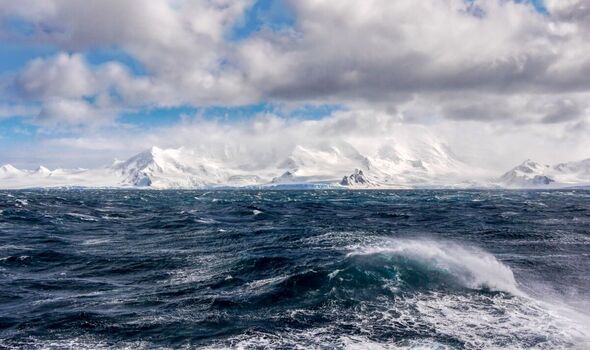Science
Antarctic Ocean Current Faces Slowdown, Raising Global Alarm

A significant environmental concern has emerged as scientists warn that the Antarctic Circumpolar Current (ACC) is slowing down, potentially leading to catastrophic global consequences. This current, which is approximately five times stronger than the Gulf Stream, plays a crucial role in regulating climate and weather systems around the globe.
The ACC is a massive oceanic system, wrapping entirely around Antarctica and transporting warm and cold water, nutrients, and dissolved carbon among the Atlantic, Pacific, and Indian Oceans. Recent research from the University of Bonn indicates that the ACC is currently operating at only a fraction of its historical speed, approximately three times slower than it was during a warm period about 130,000 years ago.
According to core samples analyzed by the researchers, the ACC’s reduction in flow could significantly impact climate patterns. Dr. Michael Weber, who leads the Bonn expedition, stated, “The velocity in the second-to-last warm period… was more than three times greater than in the last millennia comprising the current warm period.” This historical context highlights the current acceleration of climate change, raising alarms about future shifts.
Scientists emphasize the critical role of the ACC in climate stability. Dr. Bishakhdatta Gayen, an associate professor at the University of Melbourne, warned, “If this current ‘engine’ breaks down, there could be severe consequences, including more climate variability, with greater extremes in certain regions, and accelerated global warming.” The current’s ability to act as a carbon sink is vital for maintaining the planet’s climate balance, and its weakening could lead to increased carbon dioxide levels in the atmosphere.
The research team from the University of Bonn employed sediment samples collected from the Scotia Sea, situated north of Antarctica, to gauge the ACC’s historical performance. Their findings indicate that climate change could cause a further slowdown of the current by as much as 20% by 2050. This projection stems from simulations conducted using advanced computational models, which suggest that rising ocean temperatures will exacerbate the current’s decline.
The implications of a weakened ACC extend beyond the Southern Hemisphere. The current significantly influences weather systems across the globe, including the temperature moderation experienced in the UK and Europe, where the Gulf Stream helps maintain a milder climate compared to other regions at similar latitudes. If the ACC were to collapse or slow dramatically, it could lead to severe shifts in weather patterns, potentially triggering more extreme weather events across various regions.
As the scientific community continues to monitor the ACC, the urgency of understanding its dynamics grows. The current’s health is not only a concern for scientists but also for policymakers and communities worldwide. The findings from the University of Bonn and the University of Melbourne underscore the need for a coordinated global response to climate change, highlighting the interconnectedness of ocean currents and global climate health.
In conclusion, the potential collapse of the Antarctic Circumpolar Current poses a significant risk to the planet’s climate stability, necessitating immediate attention and action from the international community. With the stakes high, researchers are calling for increased awareness and proactive measures to mitigate the impacts of climate change on this vital oceanic system.
-

 Health3 months ago
Health3 months agoNeurologist Warns Excessive Use of Supplements Can Harm Brain
-

 Health3 months ago
Health3 months agoFiona Phillips’ Husband Shares Heartfelt Update on Her Alzheimer’s Journey
-

 Science1 month ago
Science1 month agoBrian Cox Addresses Claims of Alien Probe in 3I/ATLAS Discovery
-

 Science1 month ago
Science1 month agoNASA Investigates Unusual Comet 3I/ATLAS; New Findings Emerge
-

 Science4 weeks ago
Science4 weeks agoScientists Examine 3I/ATLAS: Alien Artifact or Cosmic Oddity?
-

 Entertainment4 months ago
Entertainment4 months agoKerry Katona Discusses Future Baby Plans and Brian McFadden’s Wedding
-

 Science4 weeks ago
Science4 weeks agoNASA Investigates Speedy Object 3I/ATLAS, Sparking Speculation
-

 Entertainment4 months ago
Entertainment4 months agoEmmerdale Faces Tension as Dylan and April’s Lives Hang in the Balance
-

 World3 months ago
World3 months agoCole Palmer’s Cryptic Message to Kobbie Mainoo Following Loan Talks
-

 Science4 weeks ago
Science4 weeks agoNASA Scientists Explore Origins of 3I/ATLAS, a Fast-Moving Visitor
-

 Entertainment4 months ago
Entertainment4 months agoLove Island Star Toni Laite’s Mother Expresses Disappointment Over Coupling Decision
-

 Entertainment3 months ago
Entertainment3 months agoMajor Cast Changes at Coronation Street: Exits and Returns in 2025









